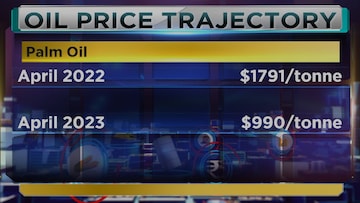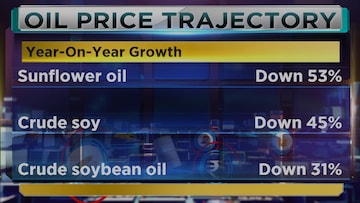The Department of Food and Public Distribution has advised the Solvent Extractor Association of India to tell its members to ensure that there is a reduction in edible oil prices, and to pass on the benefits to consumers.
While prices of edible oils have witnessed a sharp decline in past six months, the Indian prices have not declined as much, at least not on the MRP front.
India's consumption of edible oils was also higher in March than in January. Palm oil prices are a key indicator of the edible oil market, and the prices for this commodity have fallen drastically over the past year.
In April 2022, the price of palm oil was $1,791 a tonne, but by April 2023, it had dropped to $990 a tonne.
Similarly, the prices of other edible oils have also declined significantly in India. Sunflower oil prices have decreased by 53 percent year-on-year, crude soy prices by 45 percent, and crude soybean oil prices by 31 percent.
According to Atul Chaturvedi, Executive Chairman at Shree Renuka Sugars, reducing prices takes time as falling prices in the international market takes a minimum of three weeks to take effect at the retail level.
Additionally, there are rules in place that require the maximum retail price (MRP) to be printed in the factory itself, making it challenging to adjust prices once goods leave the factory premises. As a result, mills often try to keep the MRP a little high to avoid the need to change prices when prices go up in the future.
“There is a rule which says that the MRP needs to be printed in the factory itself. So what mills normally do is try and keep the MRP a little high. So in the event of prices going up, they don't need to do anything about that,” he said.
Chaturvedi also pointed out that the government has not yet advised the Solvent Extractors Association (SEA) on this issue. Instead, SEA has advised its members to reduce the MRP of edible oils. He anticipates that the government will soon start looking into this matter.
Sudhakar Desai, the CEO and Director of Emami Agrotech, has pointed out that mustard seed prices have fallen below the minimum support price (MSP) — the market is operating at around Rs 4,800, while MSP is at Rs 5,450.
The Indian Vegetable oil Producers’ Association (IVPA) has recommended a couple of measures to help mustard farmers. Firstly, they suggest increasing the differential between cost and pricing unit (CPU) on crude oil to 15 percent, up from the current differential. This would benefit farmers and encourage them to continue cultivating mustard crops. Secondly, they recommend relooking at the absolute duty to ensure that mustard seed prices go above MSP.
The market has also seen a unique convergence of prices, with palm, sunflower, and soybean oil all available at similar prices. This has made consumers happy with the prices not only coming down but all oils being available at similar prices.
First Published: May 2, 2023 5:33 PM IST





